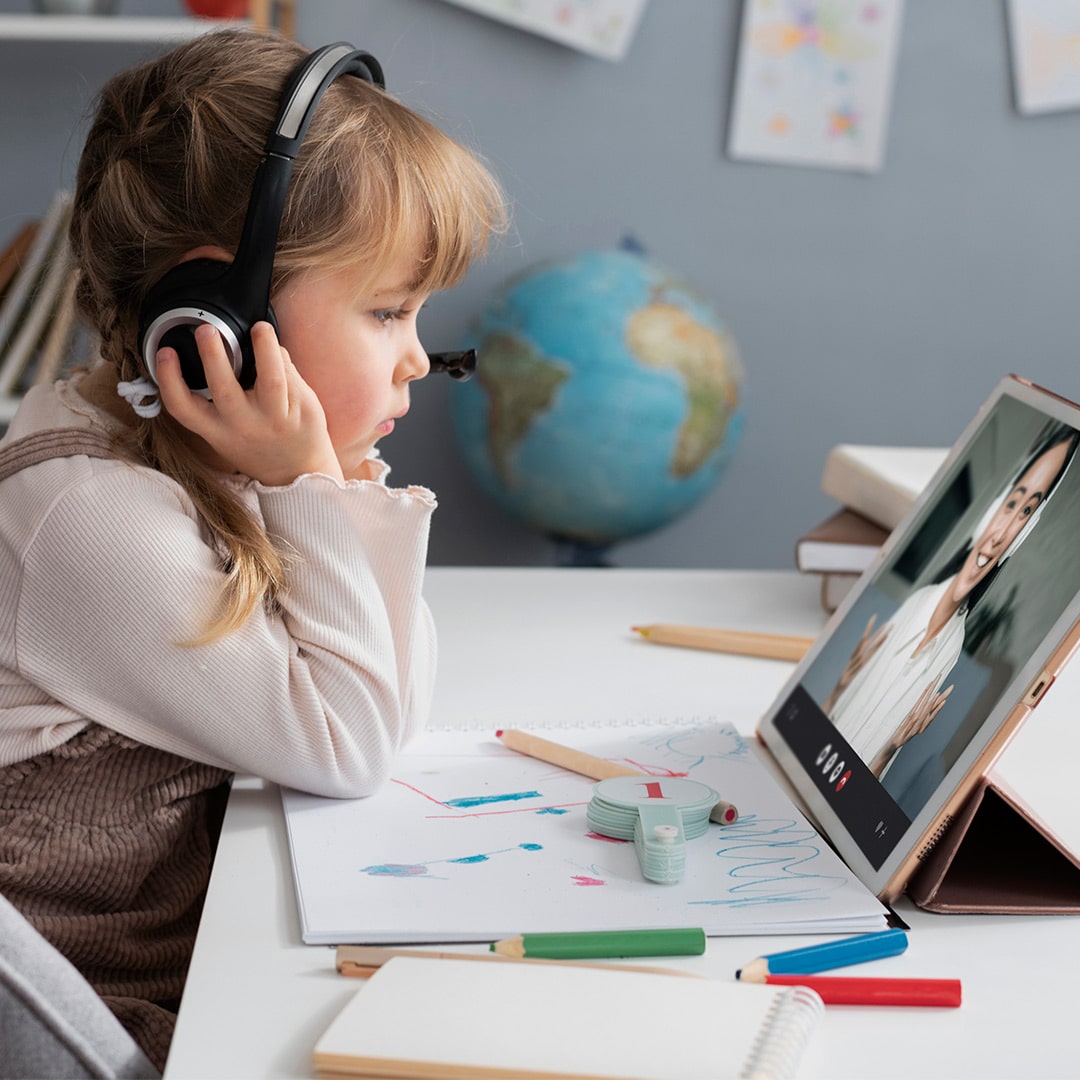Please enter the code we just sent to whatsapp 91-11-46710500 to proceed
Didn't Receive OTP?

“One of the most important elements in teaching, conducting, and performing, all three, is listening.” – Itzhak Perlman
What is the most common way of communicating—speaking, listening, reading, or writing? You might think it’s speaking, but it’s LISTENING! Right from birth, listening is essential skill for developing language comprehension. Children listen to their parents’ words before they mimic sounds and speak their first words. Therefore, listening is one of the most important skills needed to fully understand the English language, or even while the child learns English online. Being an online English-speaking portal in India, we have understood one fundamental aspect that affects most of the languages fluency. Let us see how we can help children in mastering the art of listening.
Developing language expertise:
Listening is one of the four core skills in online English learning. Although the other three skills—reading, speaking and writing —are essential for language competence, listening plays a pivotal role in developing language expertise. It is possible only to adapt the sound, stress, and intonation of a language by listening; proper hearing allows for developing language proficiency. It requires a lot of concentration and listening to discern the many subtleties in a language.
Key feature of a good communicator:
Listening is the most crucial communication factor as one cannot respond adequately without listening first. Research shows that adults devote about half of their communication time to listening while speaking, the reading, and writing contribute 30%, 15%, and 10% respectively. These results clearly indicate that speaking is the most popular language ability in acquiring English, or any other language.
Listening; An Essential skill for the Child
Practising good listening habits during the child’s developmental stage has a range of benefits in different aspects of his/her life like academic excellence, social relations, emotional quotient, and inferential reasoning.
How Bambinos’ online Spoken English courses help in improving listening skill
Here are some key benefits:
1. Academic Success: Active listening in classroom improves lesson understanding, resulting in academic success. Students with good listening skills are able to follow instructions precisely- they can understand more difficult ideas easily and they can remember better what was taught ultimately with better grades and better academic results.
2. Active Communication: Listening is an indispensable feature of good communication. Kids who are good listeners will be able to take part more actively in conversations, express themselves clearly, and understand other people's views and standpoints. This skill is important for taking part in classroom discussions, and presenting one’s ideas confidently, as well as developing strong relationships with peers and teachers.
3. Teamwork: Listening skills are essential in cooperative learning, responsible for teamwork. By paying attention to their peers, children can develop appreciation of different perspectives, make invaluable contribution to group discussions. This gives rise to teamwork, understanding and respect among team members.
4. Social and Emotional Intelligence: Listening well plays a huge role in building social and emotional intelligence. When children actively listen to or talk with others, they pick up on others' emotions, are able to relate better to their emotions, and manage social interactions more easily. This yields to tighter interpersonal relationships, greater empathy and higher conflict resolution abilities.
5. Empathy: Children can see and feel a situation through another person when they obtain experience with intense listening. Such experience will develop them deeper sense of empathy. This develops kindness, tolerance and inclusivity in their relations with others.
6. Critical Thinking: Effective listening promotes critical thinking. Active listeners are able to identify decisive elements, highlight main points, and appraise the argument better. This empowers them to make reasoning judgments, solve problems creatively and critically think about the world around them.
It is possible to enhance listening skills through active involvement of the child. Here are some effective strategies to help develop your child's listening skills:
1. Shadowing: You can motivate your child to either shadow you or auditory materials such as podcasts, songs, or audiobooks. Child can pick up from pronunciation, intonation, and language patterns from the native speakers or engaging videos, and at the same time, enjoy the content.
2. Deep conversations: Foster active listening by prompting open-ended questions and encouraging reflection, while validating their thoughts and feelings. This encouraging atmosphere serves them as a tool for communicative reading and writing.
3. Listening quizzes and tests: Try to apply different formats – for instance, you may choose several multiple-choice questions, some short-answer responses, or at least a paragraph of a listening statement.
4. English courses on phonics and communication: Enrol your child in English phonics , pronunciation, and communication learning courses. The online spoken English courses offer systematic instruction and practical sessions for children to build listening skills in a supportive learning environment. The children learn the phonetic sounds and techniques of communication that enhance their English understanding and communication skills, which make them confident.
To improve the way that you use your listening activities, consider writing down what has been said and then transcribing what you hear.
1) It is also possible to create flashcards for the daily-learned vocabulary and write summaries of what you have heard. Discussing with an individual about what you have heard can also be highly beneficial.
2) While listening, focus on the “keywords” in the spoken sentences. Identifying these keywords enables you to grasp the message of the speaker.
3)Repeatedly hearing the same phrase will help you to understand the rest of the words in that sentence.
While you are practising practical exercises to develop your listening abilities, you will be prepared for the further development of your English proficiency using various devices and sources for enhanced listening. These tools can really deepen your listening skills and give you a lot of additional assistance in the language acquisition process.
Shape Your Kid's Future with Bambinos Classes | Bambinos.live India's No. 1 English Communication Platform For Kids | Book a Free Class Now